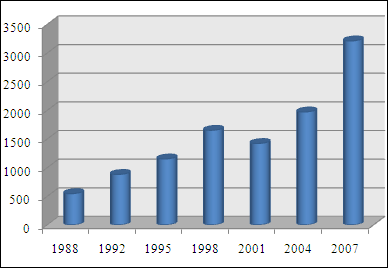経済成長論で著名なポール・ローマーが始めたCharter Citiesについて本人へのインタビューがFreakonomicsに出ている:
Can “Charter Cities” Change the World? A Q&A With Paul Romer – Freakonomics Blog – NYTimes.com
チャーター都市のアイデアは次の一節にまとまっている。
The key to the project is a charter city, which starts out as a city-sized piece of uninhabited territory and a charter or constitution specifying the rules that will apply there. If the charter specifies good rules (or in our professional jargon, good institutions) millions of people will come together to build a new city.
それぞれのチャーター都市は都市形成に必要な無人地域から始まる。都市はチャーターないし憲法という形で独自のルールを持ち、そのルールがよいものであれば新しい都市が形成される。もちろんこれに対して適切な問いは:
Aren’t the cities that the world needs springing up naturally?
何故それを人工的に始める必要があるのかということだ。それに対しポール・ローマーは、
The evidence suggests to the contrary that many societies are stuck with bad rules. Moving from bad rules to better ones may be much harder than most economists have allowed. The construct of a charter city is a suggestion about how we can change the dynamics of rules. It is a way to speed up the rate of improvement in the rules.
実際に社会における悪いルールが改善されることは非常に稀だと述べている。既存の都市における規範が改善するのを待つよりも新しい規範を備えた都市を作る方が効果的だと言う。その例として、
suppose you were the president of Cuba. Suppose you wanted to do for Cuba what Deng Xiaoping did for China
中国における経済改革を挙げている。そしてそのような特区を作るためには国際協定が必要となる。
In practice, countries around the world, even countries that can’t get along, still respect treaties.
第三国を巻き込むことでコミットメントの問題を解決するわけだ。しかし現実性はどうなんだろう。
People always think that the unfamiliar is impossible. Many times, all that holds us back is a failure of imagination.
聞いたことがないからといって無理だと思っていては始まらないと述べられている。それは尤もだが日本での経済特区が成功しているようには思われない。既に形成されている大都市のアドバンテージが余りにも大きいのが原因のように思われる。もちろん彼の主な興味の対象は都市人口の比較的小さな開発途上国にあるため状況は異なるだろう。
ちなみに質問の冒頭は的外れだ。
You recently gave up your tenured teaching position at Stanford to launch an ambitious development initiative.
彼ならどの大学も喜んで席を用意してくれるだろう。

